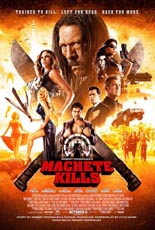
 While Machete Kills is nearly indistinguishable from the 2010 original Machete, it does bring one differentiating element to the table by beginning with a fake trailer. This in-joke within an in-joke not only nods to the accidental franchise’s birth as a faux coming attraction that kicked off Robert Rodriguez’s half of 2007’s Grindhouse, but also proves to be the best part of this sequel. Since it promotes a purported third chapter set in the realm of ’70s cinematic outer space, how could it not? Perhaps Rodriguez should have ended Kills with this gag, as the whole movie sets the story up for heading that direction; it’s like hearing the punchline first.
While Machete Kills is nearly indistinguishable from the 2010 original Machete, it does bring one differentiating element to the table by beginning with a fake trailer. This in-joke within an in-joke not only nods to the accidental franchise’s birth as a faux coming attraction that kicked off Robert Rodriguez’s half of 2007’s Grindhouse, but also proves to be the best part of this sequel. Since it promotes a purported third chapter set in the realm of ’70s cinematic outer space, how could it not? Perhaps Rodriguez should have ended Kills with this gag, as the whole movie sets the story up for heading that direction; it’s like hearing the punchline first.
After his partner is killed during a mission at the border, the superhuman Mexican known as Machete (Danny Trejo, xXx), is hired by the President of the United States (Charlie Sheen, here credited under his actual name of Carlos Estevez) to execute a cartel turncoat / schizophrenic madman named Mendez (Demian Bichir, The Heat) who has a big ol’ missile pointed at America and a $10 million bounty on his head. Machete soon learns that Mendez has whipped up a life-insurance policy, so to speak, by wiring the missile to his heart; should his meat ticker stop, the weapon’s ticker starts.
 And that’s merely one loco idea in the screenplay by newcomer Kyle Ward (and not by Rodriguez, strangely enough). Others include pairing Machete with a Texas beauty pageant contestant (Amber Heard, All the Boys Love Mandy Lane); befitting a bordello madam (Sofia Vergara, the hot tamale of TV’s Modern Family) with a metal bra that fires bullets; and having a character named El Camaleón be played by, in order of appearance, Walt Goggins, Cuba Gooding Jr., Lady Gaga and Antonio Banderas. Exactly none of these wacko bits advances the plot, save for the stunt casting of former Lethal Weapon Mel Gibson as the villainous Voz, a tech billionaire who happens to be a clairvoyant end-timer.
And that’s merely one loco idea in the screenplay by newcomer Kyle Ward (and not by Rodriguez, strangely enough). Others include pairing Machete with a Texas beauty pageant contestant (Amber Heard, All the Boys Love Mandy Lane); befitting a bordello madam (Sofia Vergara, the hot tamale of TV’s Modern Family) with a metal bra that fires bullets; and having a character named El Camaleón be played by, in order of appearance, Walt Goggins, Cuba Gooding Jr., Lady Gaga and Antonio Banderas. Exactly none of these wacko bits advances the plot, save for the stunt casting of former Lethal Weapon Mel Gibson as the villainous Voz, a tech billionaire who happens to be a clairvoyant end-timer.
As with its predecessor, Machete Kills is to be taken as a chunk of cinematic queso, period. Trejo’s ever-frowning hero is easy to root for — especially for an action-oriented protagonist pushing 70 — and several of the supporting players get the joke, none more than the unexpectedly very funny Bichir. That joke has a shelf life, however, and would operate better under the economy of Rodriguez’s early work. (Lest we forget, his 1992 debut, El Mariachi, was only 81 minutes.) Even at his usual breakneck pace, this action-packed goof is just a little too long in the tooth — one that nonetheless still gleams with mischief. —Rod Lott
